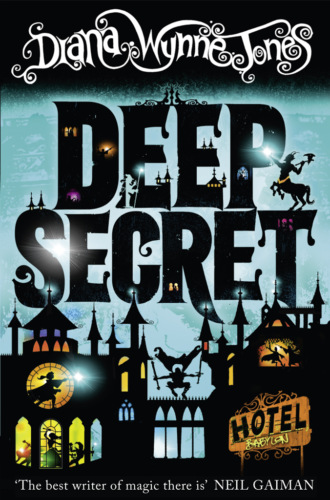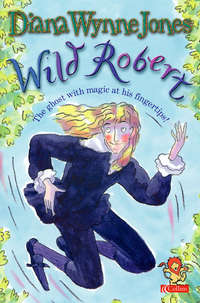
Полная версия
Deep Secret
I had not realised he was much above sixty, and said so.
“Oh yes,” he said. “I’ve kept my condition. Most of us do. Then one day you get told, ‘That’s it, boy. Deathday tomorrow,’ and you know it’s true. I’ve been given until sundown.”
I looked out of the window involuntarily. It was November. The shadows were long already.
“Call the doctor just before sunset,” Stan said, and did not say much for a while after that. I gave him some water, got myself some more coffee and waited. Some time later, he began to talk again, this time more generally and reminiscently.
“I’ve seen this world through a lot of changes,” he remarked. “I’ve helped clear away a lot of the political garbage that built up through this century. We’ve got the decks cleared for the changes due to come in the next century now. But, you know, the thing I take most pleasure in is the way we’ve managed to coax this world Ayewards. Gradually. Surreptitiously. When I was a lad, no one even considered there might be other universes, let alone talking of going to them. But now people write books about that, and they talk about working magic and having former lives, and nobody thinks you’re a nutcase for mentioning it. And I think, I did that. Me. I slid us back down the spiral. Back to where we should be. Earth is one of the early worlds, you know – well of course you know – and we should be a long way further Ayewards than we are.”
“I know,” I said, stressfully watching the shadow of my car spread over his bushy lawn.
“Help it along some more,” he said.
“It’s one of the things we’re here for,” I said.
Later, when the room was getting dim, Stan said suddenly, “It was the homesickness that brought me back here, you know.”
“How do you mean?” I asked him.
“I started out my work as a Magid a long way Ayewards,” he murmured. His voice was getting weaker. “I chose it. A bit like Simon chose it. But I chose it for the centaurs. I’d always loved centaurs, always wanted to work with them. And as soon as I learnt that more than half the places Ayewards of here have centaurs, off I went. I thought I’d never come back here, you know.” Centaurs need a magical ambience to maintain them – well, you know they do – and they all died out here when we drifted off Naywards. And for three years I was blissfully happy, working with centaurs, studying them. I don’t think there’s a thing I don’t know about centaurs and their ways. Then I got homesick. Just like that. I can’t tell you what for. It was too general. It was just that the world I was on wasn’t this one. It didn’t smell right. The wind didn’t blow like it does here. Grass the wrong green. Small things, like the water tasting too pure. So back I had to come.”
“To work as a jockey,” I said.
“It was next best to being a centaur,” he said. After a long pause, he added, “I want to get reborn as a centaur. Hope I can arrange that.” Then, after a longer pause still, “Better phone that doctor then.”
The phone was in the kitchen. I went through there and found the number carefully written on a pad laid by the phone. I remember thinking, as I punched it in, that this seemed hard on young Timotheo. I must have been one of the few people to be sorry he was dead, and yet all my sorrow was concentrated on Stan. I forgot Timotheo again the next moment. Stan had made his arrangements with care. The doctor, to my astonishment, answered the phone himself and promised to be there in ten minutes. I rang off and went to the front bedroom.
“Stan?” I said.
There was no answer. He had fallen half off the bed as he died and he had wanted to do that in private. I put him gently back.
“Stan?” I said again, into the dead, dim air.
There was nothing. I could feel nothing.
“So much for the idea of staying around,” I said loudly. But there was still nothing.

A little before Christmas, when most of the other small and large things connected with Stan’s death were done, I had a serious look at the list he had given me. There were five names on it, two of which were female. The addresses indicated that one of these women was British and the other American. The males were from Britain, Holland and – I had to get out my atlas – Croatia. I sighed and tried to look forward to travelling to meet all of them on various invented excuses. At least three of them spoke my language. I could call that lucky, I supposed. Stan had also supplied the dates of birth for all of them except the Croatian. The British girl and the man from Holland were both young. She was twenty, he was twenty-four. That was a point in their favour. The other two were in their forties. I found that a bit daunting. I had just been twenty-six, and the idea of having someone so much older for a pupil filled me with apprehension.
But I set to work to find them all.
I do not wish to describe the frustrations of that search. With interruptions from my neighbour – of whom more hereafter – and my mother’s natural desire to have at least one of her sons home for Christmas, I was divining, travelling or querying my various sources non-stop for six weeks. I flew to Amsterdam to find the Dutchman, Kornelius Punt, only to discover that he had won some kind of scholarship enabling him to travel. He had taken serious advantage of it too. I went down to Avignon, where he was last heard of, and found that he had gone to Rome, Athens and then Jerusalem. After a maddening four days, dealing with the Greek and Italian telephone systems, I came home to find a fax from a Magid visiting Israel informing me that Punt had gone to Australia. I gave up and decided to wait for him to come back. My American contacts traced the older woman, Tansy-Ann Fisk, soon after that. I was just preparing to fly out to Ohio when all sources sent urgent messages not to bother. Fisk had gone into retreat in some kind of all-female clinic where men were not allowed. Looking up this clinic in Magid records, I was a little perturbed to find it carried the remark ‘Query dubious esoterica’. Still, she could have entered the place in good faith for a simple rest-cure. All I could do was wait until she came out. The British man, Mervin Thurless, was equally hard to trace. Eventually it emerged that he was on a lecture tour in Japan. As for the Croatian, Gabrelisovic, I don’t have to remind you that there had been a war there. My NATO sources rather feared he was among the many who had vanished in it without trace.
I turned to hunting for the British girl with some relief. At least we were both in the same country. Moreover she was younger than me and possessed, according to Stan’s list, the greatest amount of untrained talent of the lot. She was the one I secretly hoped to select. I even allowed myself very agreeable visions of her as a pretty and intelligent young woman whom it would be a pleasure to instruct. I visualised myself laying down the laws of the Magids to her. I saw her hanging on my every word. I looked forward to meeting her.
I couldn’t find her either.
She had a slightly complex family history. The address I had for her proved to be that of an aunt, her father’s sister, in Bristol where Maree Mallory seemed to be a student. I stood on the aunt’s doorstep in Bristol, in the pouring rain, while damp children pushed in and out of the house around me. Before long, the children formed a yelling, fighting heap behind the aunt. She shouted at me above the din that poor Maree had gone back to her mother in London, didn’t I know? Parents divorced. Sad case. I bellowed to be told whereabouts in London. She screamed that she couldn’t remember, but if I didn’t mind waiting she’d ask her sister-in-law. So I stood for a further five minutes in the rain watching the aunt across the fighting heap of children while she telephoned further down the hall. Eventually she came back and screamed an inaccurate address at me. I wrote it down, with further inaccuracies caused by damp paper and blotches of rain, and went to London the next day. It rained that day too.
The address was in South London. That part I got right. But when at last I found it, it proved not to be called Rain Kitten as I had written down, but Grain Kitchen. It was a healthfood shop. The lady standing behind a glassed-in display of more kinds of beans than I knew existed was tall and slender in her white overall. The white cloth round her head revealed youthful fair hair. She was so young-looking and comely that, for a moment, I had hopes that she was Maree Mallory herself. But when I came nearer, she looked older, possibly even over forty. She could have been Maree’s mother. My blotched notes said that in this case she would be a Mrs Buttle; but the sign over the door had read PROPRIETORS L. & M. NUTTALL. I decided not to risk names. I told her politely that I was looking for Maree Mallory.
She stared at me with her head on one side, in a summing-up way I found slightly ominous. “I’m not helping you,” she announced at length.
“Can you tell me why not?” I asked.
“You think too well of yourself,” she said. “Posh accent, shiny shoes, expensive raincoat, not a hair out of place – oh, I can see well enough why you let her down like that. You thought she wasn’t good enough for the likes of you, didn’t you? Or didn’t she iron your shirts to your liking?”
I know I was speechless for a moment. I could feel my face flooding red. I do, certainly, like to be well dressed, but I found myself wanting to protest that I always iron my own shirts. It was too ridiculous. I pulled myself together enough to say, “Mrs – er Buttle – Nuttall? – I assure you I have not let your daughter down in any way.”
“Then why is she so upset and saying you have?” the lady demanded. “Maree’s not one to lie. And why have you come crawling to me? Realised you let a good girl slip between your nicely clipped fingernails, have you?”
“Mrs Buttle—” I said.
“Nuttall,” said she. “I never did like men who wear cravats. What’s wrong with an honest tie? Let me tell you, if I’d seen you when she first took up with you, I’d have warned her. Never trust a cravat, I’d have told her. Nor a mac with lots of little straps and buttons. Clothes always tell.”
“Mrs Nuttall!” I more or less howled. “I have never met your daughter in my life!”
She looked at me disbelievingly. “Then what are you here for, dripping all over my shop floor?”
“I came,” I said, “because I am trying to trace your daughter, Maree Mallory, in connection with – with a legacy which may come her way.” The idea of a legacy was perhaps a poor one, but I was too flustered to remember all the cleverer pretexts I had invented on my way to Bristol the day before.
It seemed to impress Mrs Nuttall. It was her turn to blush. Her fair pink skin went a strong purple and she clapped both hands over her mouth. “Oh. You mean you’re not this Robbie of hers, then?”
“My name is Rupert Venables, madam,” I said, hoping to rub the embarrassment home.
“Oh,” she said again. I assumed she was about to relent and summon her daughter from a flat upstairs or somewhere. Not a bit of it. “Prove it,” she said, as her flush died down. And when I had shown her a business card, she said, “Anyone can have a card printed.” So I produced my driving licence, a credit card and my chequebook. She looked at them long and hard.
“I didn’t bring my passport,” I said, not altogether pleasantly.
To which she said, “Well, Rupert’s not much different from Robbie as a name.”
“There’s all the difference in the world,” I said.
She returned to my business card and looked at it broodingly. “It says here Computer Software Designer. That’s you?” I nodded. “And this Robbie is supposed to be training for a vet,” she mused. “That is different. But why aren’t you a lawyer if it’s about a legacy?”
“Because,” I said, “I am the executor of the will. The deceased, Stanley Churning, named me executor in his will. Mrs Nuttall, much as I applaud your caution, I would be grateful if you would let me talk to Maree.”
“I suppose I have to believe you,” she said grudgingly. “But Maree’s not here.”
My heart sank. “Where is she?”
“Oh, she went to her dad when they found he’d got cancer,” Mrs Nuttall told me. “She would go. It’s not my fault she’s not here.”
“Do you mind giving me her address then?”
She did mind. She was suspicious of the whole thing. I applauded her instinct even while I tried not to grind my teeth. Eventually she said, “I suppose if it’s over a legacy…” and at last gave me an address north of Ealing.
I thanked her and went there. It took hours. And when I got there I found the house locked and the lower windows boarded up. A neighbour informed me that the owner was in hospital – a long way away, she couldn’t remember where – and the daughter had closed the house up and left.
I drove home, seething the whole way. The M25 was at a standstill. I tried to go cross-country and there were roadworks every half-mile. Talk about a run round the gasworks! I slammed my car door viciously when I finally got out in my own yard. I kicked my back door open and then slammed it shut. I tore off my damp mac. I slammed cupboards hunting for a glass. I slammed my way into my quiet, orderly living room, poured a stiff drink and threw myself into a chair. After the first swig, I had a thought. I swore, tore off my cravat and threw it at the fireplace.
“If I’d only known what you were letting me in for, Stan!” I said. “If I’d known! As it is, I give up. Now.”
“Why? What’s the matter, lad?” Stan’s voice said.
I stopped dead, with my whisky tipped towards my mouth. “Stan?”
“Here, Rupert,” his voice said, husky and apologetic, from the space by my big window. “Sorry about the delay. It’s – well, it’s not as easy to come back as I thought. It’s not like you think. There’s conditions to be met. I had to argue my case with the Lords of Karma as well as the Upper Room, and Lords of Karma aren’t easy. Not all of them are human. I don’t blame you for not looking happy. What’s the problem?”
I think if Stan had arrived at any other time, I would have had trouble accepting him. Something about that unembodied presence brought me out in cold shudders, even annoyed as I was. But I was so fed up that I drank the rest of my whisky in one gulp and told him what was the problem. And finished by yelling, “And it’s all your damned fault!”
“Steady! Steady on!” husked his disembodied voice. I had heard him talk to unquiet horses the same way. “It isn’t my fault. Another Magid has to be found. And you’re going about it all wrong anyway.”
“Wrong?” I said. “In what way wrong?”
“You always were prone to it,” he said. “Going about it like a normal person and forgetting you’re a Magid. You’ve got enormous powers, lad. Use them. Go after them the Magid way.”
“Oh,” I said. “All right. But not until I’ve had a square meal, another stiff whisky and a pint of coffee. Does your present state remember the needs of the body? Can you wait that long?”
“They’ve given me a year, these folk Up There,” he said. “If you can be ready before then.”
That was the Stan I knew. I laughed. It made me feel better.
An hour later, I took off my jacket. I was just about to hang it over a chair in my usual precise way when I thought of Mrs Nuttall and threw it after my cravat. Then I rolled up my sleeves and got to work, with Stan’s voice occasionally husking hints and short-cuts. It was a long evening. And a frustrating one. Thurless was thinking of staying in Japan permanently. Kornelius Punt had decided to go on to New Zealand. The Croatian and Maree Mallory were still untraceable—
“Well, they would be,” Stan’s voice observed, “if they want to be. They’re the two with the really strong talent.”
“And Ms Fisk is probably having a nervous breakdown,” I added.
“That follows again,” Stan said. “It’s the penalty of being odd when most people are normal. We might have gone the same way, you and me, if we hadn’t been picked out for Magids.”
“Speak for yourself,” I snapped. My mood had gone bad again after this further frustration. “I regard myself as a stable personality.”
“Do you now?” said Stan. “You forget. I knew you when you were a schoolboy. This Maree. I agree with you she’s the most likely one. Dowse around for her father. He’ll know where she is. They say fathers and daughters are always pretty close.”
I followed his advice, and it was excellent. A week later, I drove to a hospital in Kent and interviewed a tired, sagging, small man in a wheelchair who had already lost most of his hair. I could see that he had, only recently, been a fat little man with a twinkle. I could see the cancer. They hadn’t done much for it. I was desperately sorry for him. I gave that cancer a sharp flip and told it to go away. He doubled up gasping, poor fellow.
“Ouch!” he said. “First Maree, now you. What did you do?”
“Told it to go away,” I said. “You should be doing that too, but you’re hanging on to it rather, aren’t you?”
“Do you know, that’s just what Maree said!” he told me. “I suppose I do – hang on to it – it feels like part of me. I can’t explain. What should I be doing?”
“Telling the thing it’s an unwanted alien,” I suggested. “You don’t want it. You don’t seem to me to have finished what you set out to do with your life.”
“I haven’t,” he said sadly. “First the divorce came along, now this. I’m not like my brother, you know, book after book – I have just the one thing. I would have liked to patent my invention, but, well…”
“Then do it,” I said. “Where is Maree at the moment?”
“In Bristol,” he said.
“But I went to see her aunt and—”
“Oh, she’s gone to her other aunt, up the road. I made her go back, love affair or no love affair, money or no money. She’s training to be a vet, you see, and it’s not a thing you can stop halfway over.”
“I’m afraid I wouldn’t know,” I said. “Would I find her through the university, then?”
“Or the damned aunt,” he said. “Ted’s wife, Janine. Hateful woman. Can’t think why my brother married the bitch, frankly. Made even more of a mistake than I did, but Ted stuck by his – for the boy’s sake, I suppose.” He gave me the address, maddeningly enough in the same street as the house I’d gone to before, and then said anxiously, “It’s not really true I can get shot of this cancer by just thinking, is it?”
“A lot of cancers do respond to that,” I said.
“I’m not so good at thinking positively,” he said wretchedly.
Before I left I did what I could for Derek Mallory. It was no good hitting the cancer when he was embracing it so fervently, so I hit a few centres in his brain instead, trying to turn him into a more cheerful way of thinking. I suspect he felt every hit. His face puckered like a baby’s. I thought he was going to cry, but it turned out that he was trying to smile.
“That helped!” he said. “That really helped! I’m all for the mind stuff, deep down really. I’ve often argued with Maree about it. She can do it, but she won’t. Makes scathing remarks instead. She lacks belief, that’s her problem.”
So I went back to Bristol again. But not until a week had passed. First I had to earn my living. I had a lot of deadlines to meet that week, and I would have met them too, with time to spare, except that as I was sorting the last and most intractable problems, my fax machine began making the little fanfare of sound I had set it to make when it was bringing me Magid business. I went and picked up the sheet. It said:
Iforion 10.2.3413. 1100 hrs. URGENT
Emperor assassinated. Come back to Iforion
Imperial Palace soonest for immediate conference.
This message by order of the Acting Regent,
General Commander Dakros
“Oh good!” I said. “Hurrah!” That was my first reaction. That man Timos IX really had it coming, and not only because of Timotheo, either. I hoped the assassin had hurt him first. Rather a lot. Then I thought again and said, “Oh shit. No heir.” Then I thought again and added, “And what am I supposed to do about that? I’m their Magid, not their nursemaid.”
“Tell them to go whistle,” Stan suggested. He was evidently reading the fax over my shoulder.
I faxed back that I would come tomorrow.
They faxed back:
Iforion 10.2.13. 1104 hrs URGENT
Imperative you come now. Dakros
I faxed again:
Why? I’m busy here with Magid business.
Dakros (whoever he was) faxed in return:
We got the assassin’s accomplices. We’re dealing rebellion/other chaos. We need you to find the next Emperor. Real problems there. Only a Magid can solve it. Please, sir. Dakros
It was the ‘Please, sir’ that got to me. The man was a General and Acting Regent and he was saying that, like a small boy pleading. I faxed that I was on my way and, since it sounded like the kind of problem you have to spend time on, I started to pack an overnight bag. Doubtless I could borrow stuff, but in the Empire they slept in a thing like a hospital gown, tied up with tapes, which I dislike, and I hate their razors. I could feel Stan hanging over me as I packed, wanting to say something.
“What is it?” I said.
“Don’t get too involved in that Empire, will you?” he said.
“No fear. I hate the place. Why?”
“Because there’s a sort of directive out to Magids about it – not as strong as an Intention, more of a suggestion – to leave the place to go to hell in its own sweet way.”
“It can, for me,” I said. “What directive is this? A deep secret you forgot to tell me, or what?”
“No, it’s something I picked up after I – while I was – was over there – negotiating with the Lords of Karma and so on,” he confessed. “I had to go even higher up in the end. It came from a long way up. Them Up There want the Empire left alone.”
“Happy to oblige,” I said, hurling my washing things into my bag. I zipped it up and set off downstairs. “Are you coming to Iforion with me?”
There was an unhappy pause. It lasted while I hurried from the stairs and into the living room. Then Stan’s voice husked, “I don’t think I can, lad. I think I’m fixed on Earth. I may even be stuck to this house of yours.”
“That’s boring for you,” I said.
“There’s no rule that says life – I mean afterlife – has to be interesting,” he said ruefully.
I sensed him hovering wistfully in the middle of my living room as I set out for the Empire. It took several moves, from lattice to lattice, with its attendant feeling of being a pawn on a chessboard hopping from square to square – but downhill, since I was moving Ayewards. I thought as I went that Lewis Carroll got it right in Alice Through the Looking Glass. No one had ever told me, but I have always suspected that Carroll was a Magid. It is a very influential thing to do, to write books like the Alice books; and influence is what being a Magid is all about. Subtle influence.
Конец ознакомительного фрагмента.
Текст предоставлен ООО «ЛитРес».
Прочитайте эту книгу целиком, купив полную легальную версию на ЛитРес.
Безопасно оплатить книгу можно банковской картой Visa, MasterCard, Maestro, со счета мобильного телефона, с платежного терминала, в салоне МТС или Связной, через PayPal, WebMoney, Яндекс.Деньги, QIWI Кошелек, бонусными картами или другим удобным Вам способом.









